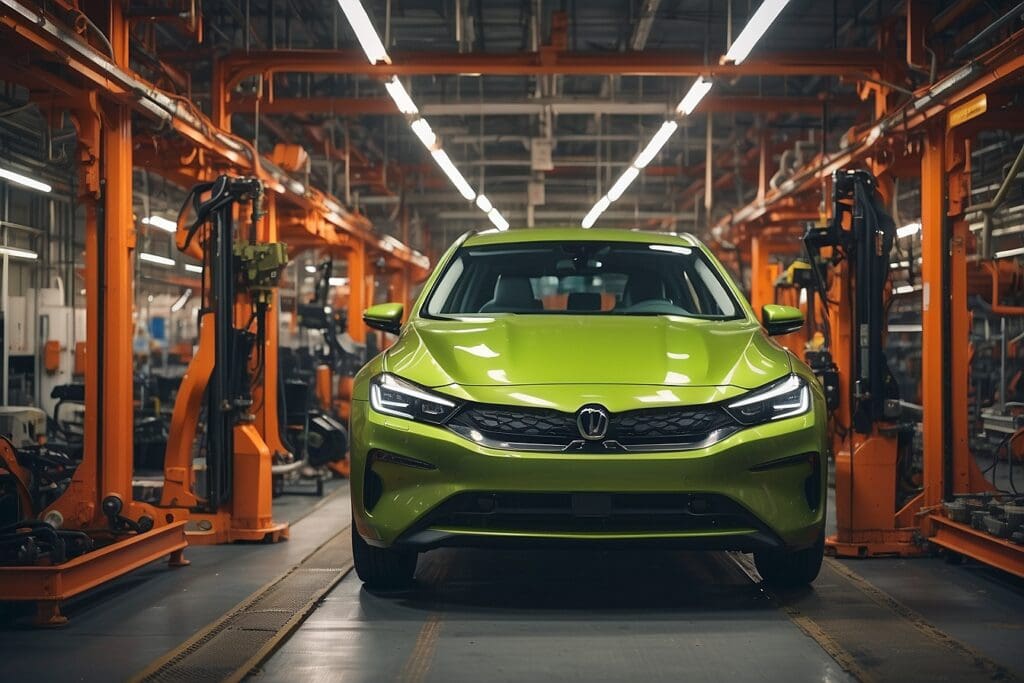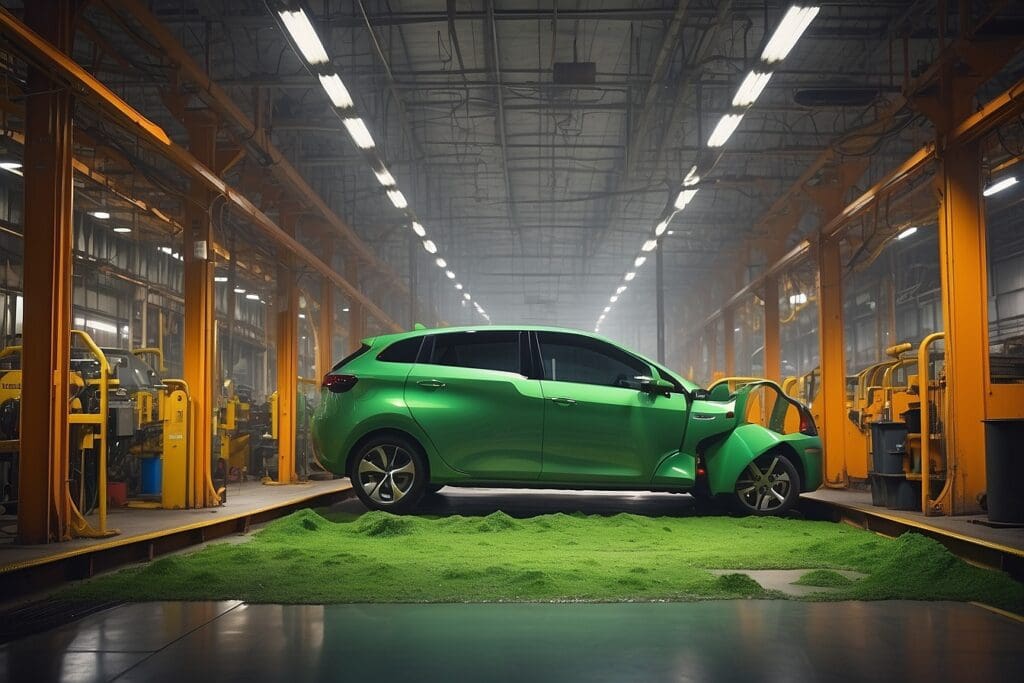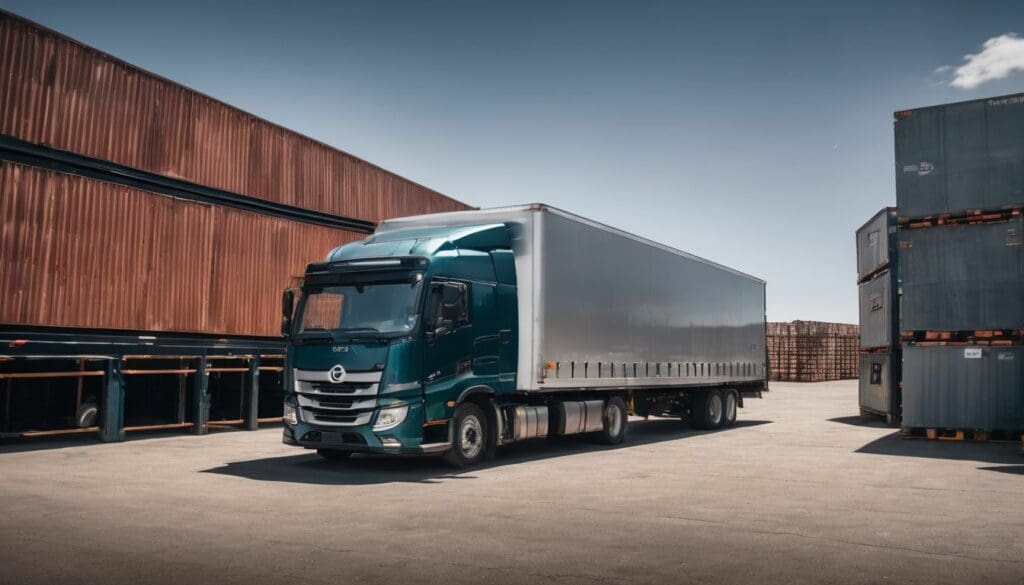Embarking on the formidable challenge of curbing carbon emissions, the automotive sector finds itself at an important junction. It’s a path we’re navigating together, mindful that transport contributes to approximately 14% of global CO2 emissions.
Our insights aim to guide you through transforming your supply chain into a beacon of efficiency and sustainability. As you read on, you’ll uncover actionable solutions to foster a greener future—solutions that are ready for implementation now.
Key Takeaways
- The automotive industry faces significant challenges in decarbonisation, including the high costs of green technology and the absence of a structured sustainability framework.
- Active collaboration with suppliers and partners alongside strict adherence to regulations is crucial for integrating sustainable practices into every facet of the supply chain.
- Employing advanced tools like data analytics, AI, blockchain and IoT can enhance monitoring emissions and energy usage while improving production efficiency.
- Shifts in mindsets towards prioritising sustainability at all levels are essential to reduce carbon footprints across the industry.
- Overcoming obstacles such as limited visibility within supply chains, overstocked inventories and quality control issues is key to achieving a greener automotive future.
The Decarbonisation Challenge in the Automotive Supply Chain

The decarbonisation challenge in the automotive supply chain is significant, with impacts including increased costs and a lack of a sustainability framework. Operationalising sustainable development also requires paradigm shifts in mindsets and cultures within the industry.
Impact of Increased Costs
As we strive for a green automotive supply chain, rising costs pose significant challenges. Transitioning to ecofriendly manufacturing comes with investment in renewable energy and sustainable materials.
These advancements require funds that can drive up overall expenses. Not only do we confront the initial outlay for green technology, but also the ongoing maintenance required to keep operations eco-conscious.
Managing these higher costs is crucial if we are to meet CO emission targets and embrace clean air initiatives without passing burdensome prices onto consumers. We prioritise innovative ways to offset expenses, such as employing clean energy solutions that may lead to long-term savings.
Our goal remains clear: advancing towards a sustainable transportation future while maintaining economic viability.
Lack of a Sustainability Framework
Transitioning from the impact of increased costs to the lack of a sustainability framework, it’s evident that without a structured approach to sustainability in the automotive supply chain, progress will be hindered.
The absence of a comprehensive framework poses challenges in setting clear environmental objectives and measuring progress towards those goals. Without defined guidelines and standards for sustainable practices, it becomes difficult for businesses to integrate eco-consciousness into their operations seamlessly.
In this landscape, environmentally conscious individuals keen on supporting conservation and embracing sustainable practices can advocate for the establishment of industry-wide sustainability frameworks.
Operationalising Sustainable Development
To operationalise sustainable development in the automotive supply chain, we need to integrate environmentally friendly practices into every aspect of our operations. This means incorporating renewable energy sources, reducing waste through recycling and reusing materials, and ensuring that our production processes have minimal environmental impact.
We must also prioritise transparency in our supply chain by working closely with suppliers to ensure compliance with sustainability standards and minimising carbon emissions throughout the entire lifecycle of our products.
Moreover, it’s essential to embrace innovation and invest in advanced technologies that can help us monitor and improve our environmental performance. By doing so, we can cultivate a culture of sustainability within the industry while meeting decarbonisation goals and promoting eco-conscious production methods effectively.
Paradigm Shifts in Mindsets and Cultures
Paradigm shifts in mindsets and cultures are crucial to creating a greener automotive supply chain. Embracing sustainable practices requires a fundamental change in how we perceive production, consumption, and waste management.
This shift involves prioritising eco-conscious decisions at every level of the automotive industry, from suppliers to manufacturers and consumers. Implementing sustainable initiatives such as recycling targets, clean air initiatives, and decarbonising supply chains necessitates a collective effort that reshapes traditional business practices towards more environmentally friendly approaches.
Shifting mindsets also involves recognising the importance of integrating sustainability into everyday operations. It requires reimagining processes with an emphasis on reducing carbon footprints and promoting cleaner energy sources like electric vehicles.
Finding Solutions for a Greener Supply Chain
Utilising advanced tools and technology, collaborating with suppliers and partners, and ensuring compliance with regulations are key solutions in building a greener automotive supply chain.
Read more to learn how these solutions can drive positive change in the industry.
Utilising Advanced Tools and Technology
- Implementing data analytics and artificial intelligence for real-time monitoring of emissions and energy usage.
- Utilising blockchain technology for transparent and traceable sourcing of materials, ensuring adherence to eco-friendly standards.
- Introducing 3D printing for on-demand production, reducing excess inventory and waste.
- Employing Internet of Things (IoT) devices to track the environmental impact of transportation, promoting efficient route planning.
- Adopting renewable energy sources such as solar panels and wind turbines to power manufacturing facilities, reducing CO2 emissions.
Collaborating with Suppliers and Partners
Utilising advanced tools and technology is crucial, but collaborating with suppliers and partners is equally important for a greener automotive supply chain. Here are some ways to achieve this:
- Establish open communication channels with suppliers and partners to align on sustainability goals and share best practices.
- Encourage joint research and development projects to innovate sustainable materials, manufacturing processes, and logistics solutions.
- Implement supplier scorecards to measure environmental performance and incentivise continuous improvement.
- Foster long – term partnerships based on transparency, trust, and shared commitment to reducing carbon footprint.
- Engage in responsible sourcing by working with suppliers who adhere to eco-friendly production practices and ethical labour standards.
Compliance with Regulations and Environmental Impact
- Adhering to strict regulations set by governing bodies ensures that the environmental impact of automotive production is minimised.
- Meeting compliance standards promotes eco – conscious production methods, reducing the overall carbon footprint of the supply chain.
- Ensuring that all suppliers and partners comply with environmental regulations aids in creating a more sustainable and greener automotive supply chain.
- Adhering to regulations also supports conservation efforts and contributes to achieving recycling targets within the automotive industry.
Top Challenges in Building a Sustainable Automotive Supply Chain

Lack of Visibility: The automotive supply chain often struggles with limited visibility, making it difficult to track and manage the environmental impact of each stage in the process.
Overstocked Inventories: Excess inventory can lead to waste and increased carbon emissions, posing a significant challenge to sustainability efforts. Quality Control Issues: Ensuring that sustainable practices are maintained throughout the supply chain can be compromised by quality control issues, impacting overall environmental performance.
Lack of Visibility
Visibility within the automotive supply chain remains a significant challenge. Limited insight into lower-tier suppliers hinders our capacity to ensure sustainable and ethical practices throughout the entire network.
This lack of transparency also obstructs our ability to trace raw materials, making it difficult to address environmental impact effectively. Without visibility, achieving our CO2 fleet emission targets and adhering to clean air initiatives becomes increasingly arduous.
Moreover, insufficient visibility can lead to reputational risks due to potential non-compliance with regulations or unethical supplier behaviour further down the chain. As environmentally conscious individuals, we recognise that overcoming these challenges necessitates proactive measures such as encouraging greater transparency and establishing robust monitoring mechanisms at every level of the supply chain.
Overstocked Inventories
Overstocked inventories can cause significant environmental and financial strain. Excess inventory leads to increased waste, energy consumption, and emissions in the automotive supply chain.
It also ties up capital that could be used for sustainable initiatives. Reducing overstocked inventories is crucial for meeting sustainability targets and conserving resources in the industry.
To address this challenge, efficient inventory management systems are essential. By implementing just-in-time inventory practices and collaborating closely with suppliers to streamline production schedules, companies can reduce excess stock levels.
Quality Control Issues
Quality control issues can pose significant challenges in building a sustainable automotive supply chain. Ensuring that components and materials meet environmental standards is crucial for reducing the carbon footprint of the industry.
Implementing strict quality control measures at every stage of production becomes vital to achieve eco-conscious production goals. Overlooking this aspect can lead to non-compliance with recycling targets, emission reduction initiatives, and general sustainability practices within the automotive supply chain.
Addressing these quality control issues demands collaboration among manufacturers, suppliers, and regulatory bodies to develop and maintain stringent environmental standards throughout the entire supply chain process.
Conclusion
Addressing the challenges of decarbonising the automotive supply chain requires proactive steps. Implementing advanced tools and technology can optimise processes towards sustainability.
Collaborating with suppliers and partners fosters a collective commitment to environmental consciousness. Compliance with regulations and prioritising environmental impact will drive positive change in the automotive industry.
FAQs
1. What are the main challenges for a greener automotive supply chain?
The main challenges include decarbonising the supply chain, coping with supply chain disruption, and meeting recycling targets while maintaining environmental sustainability.
2. Why is it hard to make the automotive industry’s supply chain eco-friendly?
It’s tough because of the need to balance strict CO2 fleet emission targets and clean air initiatives with practical automotive industry processes that support ecoconscious production.
3. How does supply chain disruption affect the automotive industry’s green goals?
When disruptions occur, it can be difficult for auto companies to manage their supplies in a way that supports sustainable practices within tight timelines and cost constraints.
4. Can you explain why decarbonising the supply chain is essential for automakers?
Decarbonising helps reduce pollution from cars, aligns with global efforts against climate change, and ensures car makers meet both legal requirements and consumer expectations for cleaner vehicles.
5. Are there specific sustainable practices being implemented in this industry currently?
Yes, leading car manufacturers are integrating more recycled materials into production and enhancing their energy efficiency throughout all stages of manufacturing to promote sustainability.





